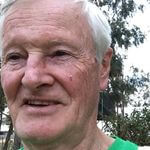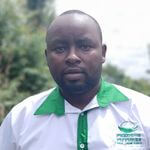Relieve hunger by building a sustainable school meals programme
Reduce poverty by training in effective farming, livestock and business methods
Promote self-esteem and independence
Feeding Futures (FF) was founded by Vanessa Bennett and Peterson Githinji based in Kenya.
Feeding Futures has developed a unique model for self-sustaining school meals. We install a water-harvesting system, kitchen and grain storage, then feed the children for the first two years. Employing agriculture specialists to work with parents to start a school farm and increase crop yields, enables parents to take over the provision of meals at school and no longer need external support.
A short history of Feeding Futures
Feeding Futures began when Vanessa Bennett from the UK and Peterson Githinji, a Head Teacher of a Primary School met and became friends. The children at Peterson’s school near Molo in Nakuru County were struggling to stay awake for classes as their parents were unable to send them to school with a full belly and a full lunch bag. Some even fainted at school due to hunger. Peterson and Vanessa committed together to help these children and Feeding Futures was born.
Initially, the focus was simply on feeding children but after two years we introduced agricultural training to parents in order to help them reach the point of being able to provide for their own children. Community engagement was challenging at this point, but many parents did take the opportunity.
Many benefits to the children were reported. Enrolment, attendance and retention all increased significantly. The school, St Brendan’s Primary School in Molo, received an award for the most improved exam scores in the area, and the feeding programme was the talk of the district. Transition rates to secondary school improved and for the first time, former pupils started to be accepted into university.
Feeding Futures then partnered with Mukinyai Primary School, providing a nutritious breakfast and lunch every school day. This time, it was agreed in advance with the Head Teacher, Board of Management and Assistant Chief that Feeding Futures was not coming as a donor but as a partner. The partnership involves Feeding Futures building infrastructure and starting the meals programme and parents would gradually take over responsibility for meals provision over a period of five years.
Commitment to the work was needed by parents and the wider community. It was made clear that the partnership would end after five years so parents would need to work hard to take over the meals provision within that time.
Feeding Futures provides agriculture training and mentoring to the community in addition to fencing, inputs and guidance for a school shamba. The school provides the labour for the shamba. This, along with increased yield and income parents achieve from improved agriculture and business basics enables them to take over the food programme.
Many of the children would have had no lunch at all and for some, it is their only cooked meal of the day. The impact of the meals, supported by effective water harvesting has been huge. The community has come together and now provides the school meals independently from Feeding Futures.
Feeding Futures is now working with its third school community – Sidai Primary School, Subukia. Progress is encouraging and parents are already providing the school with breakfast for their children.
By combining meals for children at school with community training in sustainable agriculture, Feeding Futures works to improve the long-term prospects of disadvantaged, rural communities.
Mission Statement
United for Sustainable Change
Partnering with rural communities
Increasing school attendance
Improving the perceived value of education
Improving children’s health
Improving learning and exam results
Feeding Futures is currently providing meals to around 330 children at Sidai Primary School and farm training to around 140 households. The plan is to use the ‘Partnership for Sustainability’ model with more schools in the region over the next five years but also to offer the model to others who can learn from the Feeding Futures team..
The gift of water
D. Hunja – Previous member of MPS Board of management, “Since 1976, Mukinyai Primary school has never had a single drop of water. Feeding Futures was sent here by God to prepare us for the pandemic we are experiencing right now. Pupils used to fetch water at the river Mau and you can imagine if we didn’t have water, pupils would be coming with their own water for hand-washing purposes. Now we have enough water not only to cook but for also for hand-washing.”
The benefit of school meals
The head teacher Mary Njoroge said “Needy pupils can now access at least two meals a day with one of the meals being at school since their parents cannot afford to provide breakfast or lunch at home which has been provided at school for the last 2 years”. Now ongoing.
“Cases of absenteeism have gradually reduced and the health of the children has improved since they receive a balanced diet which has been guaranteed and also an improved school discipline since in the past there were many cases of theft of money at home by the pupils so that they can buy food during lunch hour and there has been no need by the same pupils to steal money from their parents now that they have no food to buy. The moral values have also improved such as responsible children who wash their plates and cups and patience in that they queue well during meals time and in case there is a class of pupils who have been caught up in a class activity and got late for their meals actually find that the other pupils did not get double portions and left them without a meal”
SUSTAINABLE SCHOOL MEALS
-
Motivate school attendance
-
Provide energy and concentration to learn
-
Improve health and resilience
-
Improve learning and exam results
COMMUNITY PARTNERSHIP
Learning and working together produces greater productivity and motivation. The children and parents benefit as they share new skills.
AGRICULTURAL DEVELOPMENT
Delivering farm training empowers individuals to be independent and also helps communities work together and support each other.
Meet Our Team

Vanessa Bennett
Co-founder and Chair of Trustees
Vanessa’s role as founder and chair…..

Peterson Githinji
Co-founder, Executive Chair (Kenya)
Peterson is responsible for….

Colin Clark
Trustee and Treasurer
Colin’s role entails….

Michael Askwith
Trustee
Michael brings decades of experience…

Gemima Kema
Trustee in Kenya
Gemima’s role entails…

Andrew Njenga
Trustee in Kenya
Andrew is involved in….

Nderitu Nyaga
Development Support and Livestock Consultant
Nderitu is responsible for….
Pauline Wangari
Office Manager, Nakuru, KenyaPauline is responsible for ..
Pauline is responsible for co-ordinating all Feeding Futures activities in Nakuru, Kenya.

